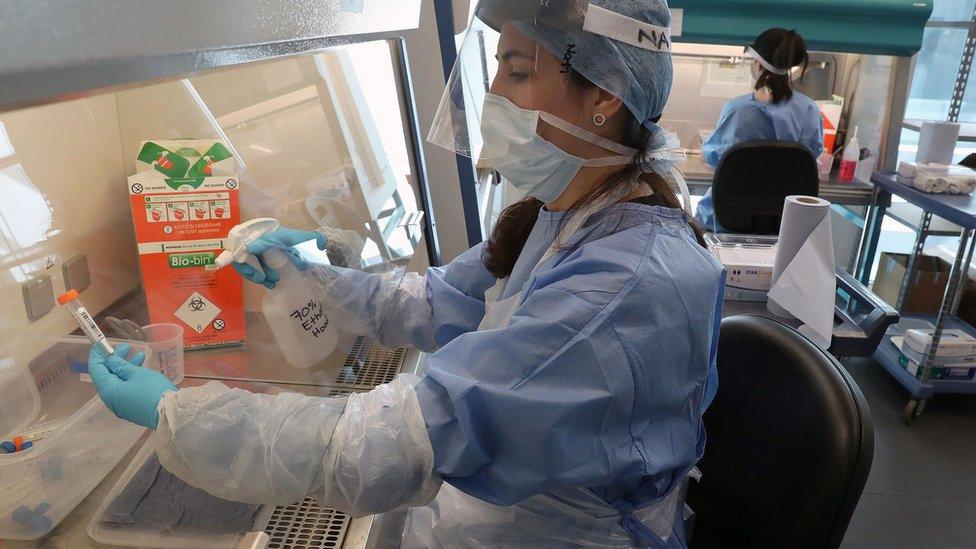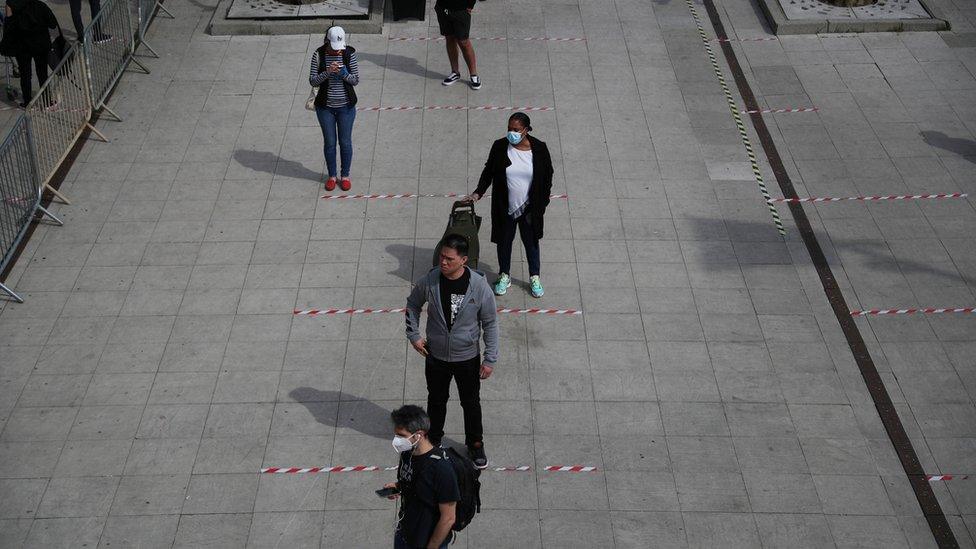Coronavirus: Mass testing earlier 'would have been beneficial'
- Published
- comments

It would have been "beneficial" to have ramped up Covid-19 testing quicker, the UK's chief scientific adviser has told MPs assessing the coronavirus response.
But Sir Patrick Vallance added testing alone would not control the virus.
England's deputy chief medical officer Dr Jenny Harries said "things would have been done differently" if capacity had not been limited at the time.
Data released on Tuesday showed there were 27,300 coronavirus-related deaths in England and Wales by 24 April.
It came as the UK surpassed Italy's reported coronavirus death toll on Tuesday, after deaths across hospitals, care homes and the wider community rose to 29,427 versus Italy's 29,315.
The government moved away from community tests and contact tracing on 12 March, as ministers decided to focus testing on patients with suspected Covid-19 in hospitals, care homes and prisons.
Health Secretary Matt Hancock later announced a goal of 100,000 coronavirus tests a day by the end of April, saying it was "what the nation needs". The government once more failed to hit the target on Tuesday, despite an initial success.
Asked what he would change about the UK's response to the virus, Sir Patrick told the committee: "I think that probably we, in the early phases, and I've said this before, I think if we'd managed to ramp testing capacity quicker it would have been beneficial.
"And, you know, for all sorts of reasons that didn't happen.
"I think it's clear you need lots of testing for this, but to echo what Jenny Harries has said, it's completely wrong to think of testing as the answer.
"It's just part of the system that you need to get right. The entire system needs to work properly."


Much like the problems getting personal protective equipment for staff, the UK's record on testing is going to come under scrutiny for years to come.
There are many reasons why other countries, such as South Korea and Germany, had a better testing infrastructure to start with.
But what remains more difficult to understand is why the UK did not act sooner to rectify that.
Certainly rapid progress was made from the start of April when Health Secretary Matt Hancock set the 100,000 tests-a-day target.
But why it took until then to turbo-boost the effort is unclear. The first confirmed case was at the end of January.
By mid-March the UK had to virtually abandon testing in the community - it did not have the capacity, so had to prioritise patients in hospital.
One school of thought is that because the policy at the time was to slow the spread of the virus in the community, rather than suppress it as is the case with lockdown, widespread testing was not needed to contain outbreaks and suppress the epidemic.

Dr Harries said a balance needed to be struck in terms of testing and ramping up capacity in the NHS, adding that "if we had unlimited capacity, and the ongoing support beyond that, then we perhaps would choose a slightly different approach".
Asked when test results would be returned within 24 hours, Dr Harries said the time period for test returns was "decreasing all the time". She said she could not put a figure on it but stressed she was aware those testing times "are coming down".
Meanwhile, the PM's spokesman said the government would set out how lockdown restrictions could be eased in some ways and strengthened in others this week "once we have the scientific evidence and we have completed the review process".
Asked about a suggestion by Scotland's First Minister Nicola Sturgeon that people there could be allowed to meet up with "small defined groups" outdoors, the PM's spokesman said: "Broadly the scientific and medical experts have been clear that there is is less likelihood of transmission of this disease outdoors than indoors.
"That will obviously be something we are considering as part of the review."
Death certificates
According to the Office for National Statistics (ONS), by 24 April there were 27,300 deaths where coronavirus is mentioned.
Including deaths reported to the ONS since 24 April, it brings the total number to more than 32,000.
These figures can also include cases where a test has not been carried out but because a doctor suspect the individual was infected. The daily government figures rely on confirmed cases.
The data goes up to 24 April - delays in reporting and completing death certificates means it lags behind the daily figures.
During the week up to 24 April there were 2,794 coronavirus deaths in care homes, up from just over 2,000 the week before.
It brings the total to nearly 6,000 in care homes since the epidemic started.
Death certificates analysis in Scotland and Northern Ireland bring the UK total to nearly 30,000 by late April. That is about a quarter higher than the daily government figures showed at that time.
Department of Health figures on Tuesday showed number of coronavirus-related deaths in the UK reached 29,427, an increase of 693.
Masks 'could help'
Sir Patrick told the Health Select Committee that evidence face masks or coverings prevent the spread of infection from one person to another is "marginal but positive", adding: "So there is some evidence they can do that."
He said: "It looks like the major root of infection in this disease is probably droplet spread, rather than through aerosol, but there may be some aerosol components as well.
"Masks may have a marginal positive effect in that situation, or face coverings of some sort might do."

A SIMPLE GUIDE: How do I protect myself?
AVOIDING CONTACT: The rules on self-isolation and exercise
PUBLIC TRANSPORT: Is it safe to travel?

The new NHS app aims to quickly trace recent contacts of anyone who tests positive for the virus and will be available to people on the Isle of Wight this week.
It is part of the government's strategy for coming out of lockdown, which aims to have widespread testing and contact tracing in place to monitor and reduce any future outbreaks.
If the trial is successful, the app will be rolled out across the whole of the UK by the middle of May, Mr Hancock said.
But the "centralised" model of the app - meaning there is a central computer server which works out which phones have matched - has raised some privacy concerns.


- Published5 May 2020
